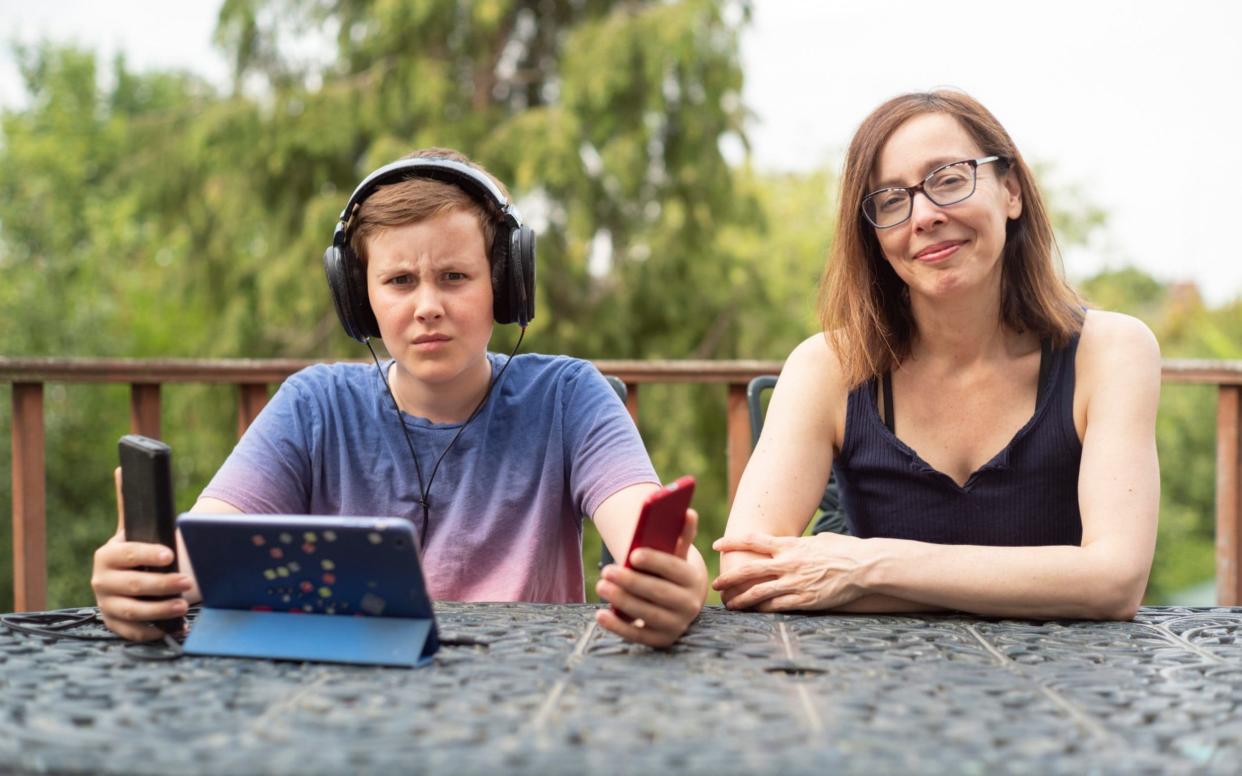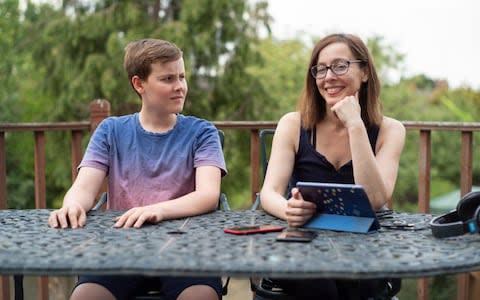Help! How do I get my teen off screens for the summer?

In the heat of every digitally-induced drama, I roar at my children, “I’ve had it with you and screens!” And then I do nothing. My 13-year old – a fine cricketer, diligent student, witty, creative – racked up 12 hours of screen time last Sunday. I felt ashamed, angry, frustrated.
Something needs to change and now, perhaps, it will.
The Telegraph has thrown down the gauntlet, and asked Conrad to try a “screen-free summer.” Six weeks bereft of his smartphone and PS4. No siting on Instagram, posting updates on his “story”, or wasting Grandma’s £10 on V-bucks to buy an “outfit” for digital-world avatars.
I passed on this outlandish suggestion to my son, expecting a flat “no.” But Conrad said, “I’ll do it – but I won’t like it!” And if your first thought is “She must be bribing him” – of course I am. He plans to spend my generous financial incentive on a video game.
How to have a screen-lite summer
But is it possible? A compulsion, by definition, is extraordinarily difficult to stop. Is total abstention the best option? Or is severely limited access wiser? I ask, not just because I’m weak, but because my goal is for Conrad to develop healthier screen habits. You can confiscate an alcoholic’s vodka, but if they still crave it, nothing is achieved.
In his co-authored book, The Distracted Mind: Ancient Brains in a High-Tech World, Dr Larry Rosen, professor emeritus of the psychology department at California State University, notes “there is no evidence that extended tech detoxes actually work.” Once the break is over, he says, we return to our “information-foraging behaviour”, frantic to catch up.
This gives me pause. I don’t want Conrad to be isolated. Perhaps I should buy him a brick phone (with no internet access) that friends can call. I’ll also allow TV, I decide – I’m not trying to recreate the 1920s. I’ll take custody of his iPhone, though, and as for the PS4, I’d be delighted to rip it from the wall.
It’s the domination of tech to the exclusion of all else that I abhor: watching children abandon books, dressing while wearing headphones and gazing at a phone
None of this would be necessary, however, if my son could moderate his use voluntarily. It’s the domination of tech to the exclusion of all else that I abhor: watching children abandon books, dressing while wearing headphones and gazing at a phone; the erosion of their mental health. My son hasn’t been bullied online, but gaming – its brutal lows, its alluring highs – takes a disturbing emotional toll.
Dr Rosen states that like a crash diet, unplugging won’t be effective “unless you work to change your environment”. One feature that will need adjusting is Conrad’s brother. Caspar, 11, is looking forward to rubbing his own online status in Conrad’s face: this signals disaster for our goal, if not a hospital visit. I’ll need to curtail Caspar’s usage too.
Meanwhile, Conrad’s routines must change. Every morning in term-time he trots downstairs, picks up his phone, and is lost to us until school. Now, he must actively decide on an alternative. I recall advice on quitting any addiction: this can’t feel like a punishment. What rewarding activity can he replace it with?
social media story
“Nothing,” Conrad says when I put this to him. Yet, today he trotted into the garden to practise skateboarding before breakfast without prompting. But this is unlikely to happen every day for six weeks.
I can’t devote my existence to policing him – nor should I – but presently, it seems that keeping Conrad offline this summer will be a full-time job. He’ll play cricket, we’ll go out, but it’s the spare time that concerns me.
On reflection, the ‘screen-free’ plan feels doomed. So I consult Belinda Parmar, who runs tech addiction workshops in schools, who believes that “one of the biggest issues is double standards” – why should Conrad alone curb his tech use? She suggests we both download the free Moment app to track our daily iPhone usage.
Statistics of how much time we spend online, and the apps to which we devote the most time, she says, will build self-awareness. “This isn’t anti-technology,” Belinda explains; it’s about education, and prompting children to reflect. Her workshops poses questions such as, “Did Steve Jobs, founder of Apple, allow his kids to use iPads?” Spoiler: no. “Why? Maybe he knew they were addictive.”
Belinda Parmar, who runs tech addiction workshops in schools, believes that “one of the biggest issues is double standards” – why should Conrad alone curb his tech use?
She also suggests writing to Conrad “about the impact of his relationship with tech” and that he write to me about why he loves it, to foster understanding. But she thinks a total screen ban is unwise. “This isn’t about taking technology away from our children,” she says. “It’s about managing it in a way that enhances their lives, and our relationship with them.”
Seeking further guidance, I call Dr Rosen in LA. He’s also author of iDisorder: Understanding Our Obsession With Technology and Overcoming its Hold On Us. When I say I’m considering a six-week screen ban for my teenager, he’s politely aghast.
“Unworkable,” he says. “Totally unworkable. Thirteen-year old tantrums are not fun, and part of the problem is you’re also making him miss out on his social world.
“By doing a detox, you’re cutting out one of the most important parts of teenage life, which is socialisation. You don’t get to socialise unless you go out and talk to someone face to face. That’s fine, but it’s not how their social world is now.”
Instead, Dr Rosen suggests a structured plan, to be negotiated with Conrad, that involves rationing daily smartphone usage. The decrease must happen incrementally, he says: I should allow him to briefly check his phone every 15 or 30 minutes. Gradually, the time between check-ins increases.

Dr Rosen explains, “We’re trying to calm the bio-chemistry of his brain. If you just take the phone away and he doesn’t know when he’s getting it back, he’ll start producing all those chemicals that make him anxious or angry.”
The PS4 is also rationed by negotiating - but Conrad must have some control, e.g. he earns extra console-time if he sticks to our plan. “There have to be boundaries and rules, but there has to be a way for him to get more. Otherwise it’s just punishment, punishment, punishment - and punishment doesn’t work without reinforcement.”
There have to be boundaries and rules, but there has to be a way for him to get more. Otherwise it’s just punishment - and punishment doesn’t work without reinforcement
Dr Rosen suggests moving the console out of sight until required: accessibility is part of the problem. Conrad must also write a list of enjoyable offline activities to pin on the fridge for instant referral – if he doesn’t have to ponder ideas, his mind is less likely to revert to gaming.
Dr Rosen adds that parents should “model good behaviour” which, with the school holidays upon us, presents a daunting challenge. But now I feel better informed, and equipped to take it on. I’ll be detailing the advice of leading experts and more, and reporting on Conrad’s progress weekly. So here’s to a sunny, screen-lite summer – I hope.
Follow Anna and Conrad's six-week summer challenge at telegraph.co.uk/lifestyle